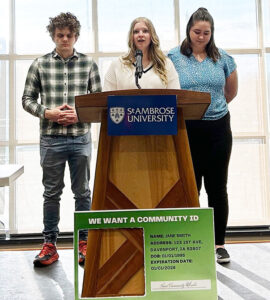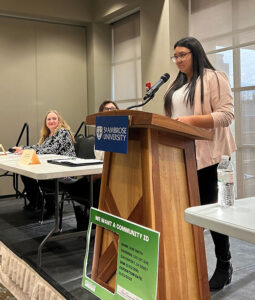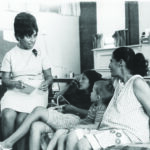
Kaitlyn Staley, a student at St. Ambrose University in Davenport, serves as moderator during a community ID forum March 14 at the university. With her are fellow students in the Master of Social Work program, Connor Lucillis and Haley Petz.
By Barb Arland-Fye
The Catholic Messenger
A community ID creates access and options for people lacking those opportunities, say its supporters, who point to Johnson County, Iowa and Moline, Illinois as two governmental entities that have or soon will implement a community ID program.
Quad Cities Interfaith and Alas de Esperanza (“Wings of Hope”) organized two forums, held March 14 at Center for Active Seniors, Inc. and St. Ambrose University in Davenport, to build momentum for a Davenport community ID program. The Diocese of Davenport and St. Anthony and St. Paul the Apostle parishes in Davenport are among 37 faith-based, nonprofit, governmental and nongovernmental organizations that support a community ID program, Quad Cities Interfaith (QCI) reports.
Senior citizens, people without homes, individuals returning from prison and immigrants are among the Davenport residents who would benefit from a community ID — a verifiable, official photo identification card — panelists said during the forums.
A community ID could be used to open a bank account, confirm one’s identity when using credit cards and pick up prescriptions at the pharmacy. It could provide proof of identity for leases and utilities, to obtain a library card, cash a check, report a crime and interact with schools, hospitals, civic and community organizations and law enforcement. Community IDs cannot be used to prove employment eligibility, vote, board an airplane, purchase alcohol or tobacco, enter establishments with age restrictions, or substitute for a driver’s license.
QCI previously advocated for a community ID program through the Scott County Board of Supervisors, which eventually turned down the request, citing concerns with verifying applicants’ identity. However, legal liability for community ID misuse would fall on individuals, and not the governmental body issuing it, QCI states.
Advocating for vulnerable populations
Youth leaders in Alas de Esperanza, based at St. Anthony Parish, are among supporters advocating for a community ID in Davenport. They have learned about the difficulty some adults have trying to open a bank account, pick up prescriptions at the pharmacy, to enter a school or a hospital, or who fear interaction with law enforcement officers for lack of a photo ID. “I am a young community leader, I am taking action to push forth this ID in hopes that other community leaders do the same,” ninth-grader Brandi Gabriel of St. Anthony Parish said during the forum at St. Ambrose.

It’s hard to keep track of personal documentation when you don’t know where you are going to sleep from night to night, said panelist Leslie Kilgannon, executive director of the Quad Cities Housing Council. She estimated that 600 to 700 people experience homelessness annually, “just on this side of the river.” A picture ID is a requirement for anyone applying for a Social Security card or acquiring housing and other essential services, she said.
Panelist Mikael Gibson, director of senior services for Center for Active Seniors, Inc. (CASI), said seniors without a driver’s license or whose state-issued identity documents may have been lost would benefit from a community ID. So, too, would seniors unable to navigate online systems for state-issued identification or who can’t afford the cost. The community ID fee would be more modest.
Panelist Gloria Mancilla, QCI’s vice president and a Registered Cardiac Sonographer, sees the need for a community ID in healthcare, particularly in emergency situations when a patient speaks another language and needs an interpreter. Mancilla, a permanent resident and St. Anthony parishioner, also knows of the struggles immigrants face when having to travel the long distance to Omaha or Chicago to renew their mátricula, an ID issued by a Mexican Consular office. Being able to apply for a community ID in your city of residence would save costs, time and work, she said.

Panelist Brian Monroe of the Safer Foundation in the Quad Cities said a community ID would provide for more efficient, timely access to housing, financial services and social services for individuals returning from the criminal justice system. The people who come to Safer Foundation “have made a commitment to make themselves better, to make themselves a contributing (member) of the community,” he said. Their inability to quickly access needed services can “trip (them) up” and may cause them to re-offend and return to prison.
The forum’s organizers shared information about a community ID’s benefits, application requirements, the extent and limitations of its use and the city of Davenport’s responsibilities pertaining to implementation. QCI estimates first-year costs at $17,565, not including personnel costs. More information, including required documentation for applicants is available at https://tinyurl.com/mr4banjc

Ninth-grader Brandi Gabriel of St. Anthony Parish in Davenport shares her support for a community ID during a community ID forum March 14 at St. Ambrose University in Davenport. Quad Cities Interfaith and Alas de Esperanza organized the forum.
Johnson County’s experience
Johnson County’s community ID program, which began nine years ago, has worked out the initial kinks of implementation, said John Deeth, who works in the Johnson County Auditor’s Office. The Center for Worker Justice worked closely with the county to make it happen, he said.
Most of the people who apply for the community ID in Johnson County are immigrants, Deeth said. “We typically get an average of one (application) per day,” he said March 15. That day, several people applied for their community ID. The biggest challenge for applicants, he said, is assuming they will receive their ID card immediately. But Johnson County mails the ID card to successful applicants as one more step to ensure verification of identity. Another challenge is that applicants may not have the required documents providing proof of their identity and residency. They can reapply with the appropriate documents.
Establishment of a community ID program would “send a message that people belong,” Kilgannon said. “We are committed to building a community in which everyone is included.”











